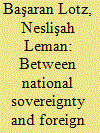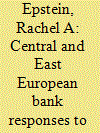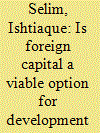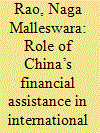| Srl | Item |
| 1 |
ID:
168366


|
|
|
|
|
| Summary/Abstract |
This article examines how the economic concessions given to foreign companies during the Ottoman Empire were assumed by the new Turkish Republic and readjusted under the new circumstances that arose after the First World War. Using mainly the documents of the French diplomatic archives and of the Turkish state, the article focuses on the negotiations between the Turkish government in Ankara and the representatives of the French companies, in the summer of 1923. Taking into account the nationalist ideas of the new Turkish government, the European governments and companies were concerned about the economic path that young Turkey would follow and they were worried about their economic interests in this country. The article puts forward that the rigorous attitude of the Turkish government regarding national sovereignty and political independence was a determining factor in these first years of the new regime but did not constitute an obstacle to the privileges of the foreign capital in Turkey.
|
|
|
|
|
|
|
|
|
|
|
|
|
|
|
|
| 2 |
ID:
120673


|
|
|
|
|
| Publication |
2013.
|
| Summary/Abstract |
In the context of transition, nine out of the 10 post-communist countries that ultimately joined the European Union reluctantly privatised the bulk of their banking sectors with foreign capital. The financial crisis of 2008-2009 therefore sparked fears that foreign banks would remove their operations from their Central and East European markets because of a 'home bias' in lending. Such fears were predicated on the widely held beliefs that banks' loyalties lie with their home markets and that it is therefore desirable to protect domestic bank ownership to help combat an economic downturn. This essay casts doubt on the value of banking sector protectionism by comparing foreign and domestic bank behaviour in Central and Eastern Europe during the crisis. The essay finds no consistent relationship between domestic control and either limited economic vulnerability or countercyclical lending.
|
|
|
|
|
|
|
|
|
|
|
|
|
|
|
|
| 3 |
ID:
095596


|
|
|
|
|
| Publication |
2010.
|
| Summary/Abstract |
Despite seemingly little prospects and meager results, many developing countries invest substantial resources in regional cooperation organizations. Considering the widespread skepticism regarding the benefits of these organizations, this enthusiasm is puzzling. This study offers an answer to this puzzle and argues that under certain conditions international organizations among developing countries function as a signal of regional peace and stability. In turn, they reduce the political risk associated with foreign investment and increase the inflow of much needed capital to the economies of their members. I evaluate this argument in the context of the Association of Southeast Asian Nations (ASEAN). I show that Indonesia forcefully promoted the formation of ASEAN and that Indonesian foreign policymakers believed that joining this organization will reverse its aggressive and irresponsible image in the eyes of international donors and investors. Evidence regarding political risk and foreign direct investment in Indonesia and other ASEAN members provide additional support for the argument.
|
|
|
|
|
|
|
|
|
|
|
|
|
|
|
|
| 4 |
ID:
103900


|
|
|
|
|
| Publication |
2010.
|
| Summary/Abstract |
Despite seemingly little prospects and meager results, many developing countries invest substantial resources in regional cooperation organizations. Considering the widespread skepticism regarding the benefits of these organizations, this enthusiasm is puzzling. This study offers an answer to this puzzle and argues that under certain conditions international organizations among developing countries function as a signal of regional peace and stability. In turn, they reduce the political risk associated with foreign investment and increase the inflow of much needed capital to the economies of their members. I evaluate this argument in the context of the Association of Southeast Asian Nations (ASEAN). I show that Indonesia forcefully promoted the formation of ASEAN and that Indonesian foreign policymakers believed that joining this organization will reverse its aggressive and irresponsible image in the eyes of international donors and investors. Evidence regarding political risk and foreign direct investment in Indonesia and other ASEAN members provide additional support for the argument.
|
|
|
|
|
|
|
|
|
|
|
|
|
|
|
|
| 5 |
ID:
104186


|
|
|
| 6 |
ID:
141600


|
|
|
|
|
| Summary/Abstract |
The movement of money fromone country to another country for development in the formof aid is known as the foreign aid. The Foreign capital or assistancehelps to reduce the shortage of domestic savings of the recipientstate. This willensuretheinflow of capital, equipment, technology and raw materials thereby raising of capital formation in the country.
|
|
|
|
|
|
|
|
|
|
|
|
|
|
|
|
| 7 |
ID:
184532


|
|
|